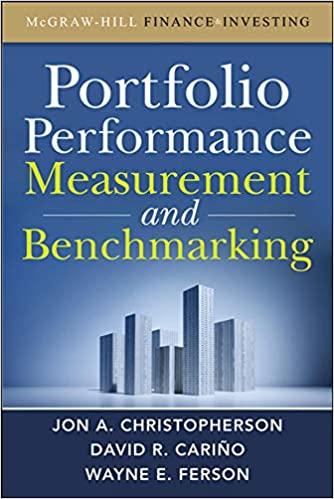Question
The aspect of risk that addresses how diverse the possible outcomes of an investment are is called: A. correlation. B. insurance policy and premium. C.
The aspect of risk that addresses how diverse the possible outcomes of an investment are is called:
A. correlation.
B. insurance policy and premium.
C. coupon and par values.
D. Dispersion.
The beta of a well-diversified portfolio of stocks is:
A .001
B. 15%
C. 1.0
Which of the following is a measure of a stock's price fluctuations with the price fluctuations of a well-diversified portfolio of stocks?
a. beta
B. risk-free rate
C. discount rate
D internal rate of return
Part of what makes up the discount rate is the risk-free rate of return.
True
False
An example of unsystematic risk is a worldwide recession.
True
False
Even if an investment has no risk, an investor would still expect at least the risk-free return.
Group of answer choices
True
False
When valuing an investment, investors prefer to use market value instead of book value.
True
False
Company A has the following Shareholders' Equity section:
| Common stock | $ 500,000 |
| Additional Paid-in Capital | 1,500,000 |
| Retained Earnings | 700,000 |
| Total Shareholders Equity | $ 2,700,000 |
If Company A's market stock price is $72 per share and it has 95,000 shares outstanding, which is higher?
A. Company As market value
B. Company A's book value
For an investment to be acceptable, the Net Present Value should be greater than 0 and the Benefit Cost Ratio should be greater than 1.
True
False
An investment's Internal Rate of Return should be higher than which of the following to be acceptable?
A. Unemployment Rate
B. Inflation Rate
C. Discount Rate
D. Coupon Rate
The Weighted Average Cost of Capital (WACC) is the discount rate used to evaluate a corporation's average-risk projects.
True
False
If a corporation consistently earns less of a return on its average-risk projects than its WACC, its stock price will:
A. stay the same.
B. decrease.
C. Increase.
If a corporation's WACC is 12% and it keeps getting a return on its average-risk investments of 10%, the corporation's stock price will:
A. decline.
B. stay the same.
C. Increase.
Below is a recent income statement for Spring Valley Conservation Technologies, Inc.:
Spring Valley Conservation Technologies, Inc.
Income Statement ($000s)
For the Year Ended December 31, 2021
| Consulting Fees | $ 920 |
| Operating Expenses | (549) |
| Depreciation Expense | ( 30) |
| Earnings Before Interest and Taxes | 341 |
| Interest Expense | ( 56) |
| Earnings Before Tax | 285 |
| Tax @ 20% | (57) |
| Net Income | $ 228 |
Calculate Spring Valley Conservation Technologies' free cash flow in this year assuming it spent $64 on capital equipment and increased working capital by $72. (All figures in $000s.)
Formula:
Free Cash Flow = EBIT(1-Tax Rate) + Depreciation - Fixed Asset Investment - Investment in Working Capital
A. $74,500.
B. $263,000.
C.$195,300.
D. 166,800.
When evaluating a project to determine its Net Present Value, a corporation must ___________ the expected Free Cash Flow of all years during the term of the project to the present values.
A. discount
B. double
C. increase
D. Disregard
Which of the following would NOT be a corporate restructure?
A. A corporation being bought by an international conglomerate
B. 6% price increase on top-selling product to keep up with inflation
C. Downsizing the number of staff by 30% as a corporation discontinues one of its major divisions
D. Two competitor companies in the same industry merging
When two companies combine to form a new company, it is called a(n)
A.liquidation.
B.treasury stock.
C.merger.
D. initial public offering.
An example of corporate restructure is which of the following:
A. acquisition
B. merger
C. All of these answers are examples of corporate restructure.
D. change in asset mix
E. change in ownership and management
When calculating terminal value:
If a company is mature and its rate of growth has peaked, the perpetual growth rate in the terminal period usually becomes higher than the rate of growth forecasted for the T period (or near future).
True
False
When purchasing a company, the acquiring company will consider which has the higher value: the target company's value as a going concern or its value in:
A. perpetuity.
B.liquidation.
C.internal rate of return.
D. terminal value.
Step by Step Solution
There are 3 Steps involved in it
Step: 1

Get Instant Access to Expert-Tailored Solutions
See step-by-step solutions with expert insights and AI powered tools for academic success
Step: 2

Step: 3

Ace Your Homework with AI
Get the answers you need in no time with our AI-driven, step-by-step assistance
Get Started


